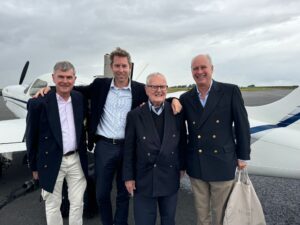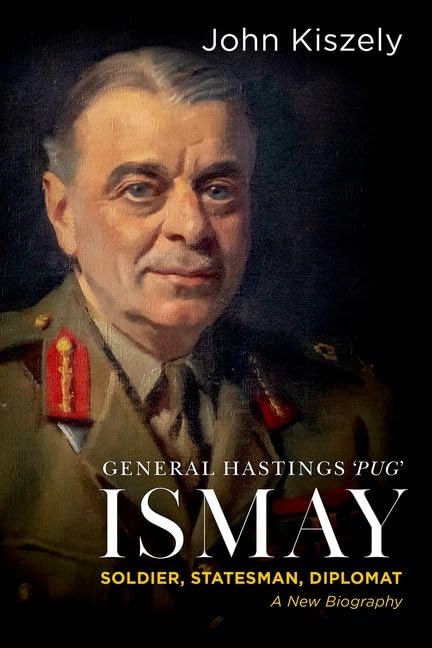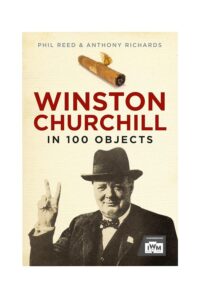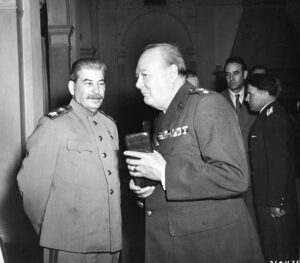
Bulletin #197 Oct — 2024
No Lapdog

To view in full, right click and choose "View in new tab"
September 28, 2024
John Kiszely, General Hastings “Pug” Ismay: Soldier, Statesman, Diplomat: A New Biography, Oxford, 2024, 424 pages, $45.00 / £35. ISBN 978–0197778135
Review by W. MARK HAMILTON
There have been previous biographies of General Hastings Ismay, but John Kiszely has given us the best so far, and by a long way, of the much-overlooked British military and diplomatic figure. During the Second World War, no individual outside Prime Minister Winston Churchill’s own family was closer to him on a daily basis. Nicknamed “Pug” because of his facial resemblance to the breed, Ismay was no mere lapdog. While Churchill provided the motive force of the British war machine, Ismay was the man who kept it oiled.
Kiszely divides his subject’s life into four periods. The first addresses Ismay’s early years as a “child of the Raj.” Born in British India in 1887, Ismay joined the Indian Army after an English military education. Like Churchill, he spent considerable time teaching himself through extensive reading. A good but not outstanding student, Ismay considered Churchill’s The World Crisis among his favorite books. In 1921 he married Laura Kathleen Clegg, a wealthy woman of Anglo-American parentage, a trait she shared with Churchill. This resulted in Ismay’s lifelong affinity for Americans. It also provided him financial independence.
The second part of the book contains perhaps the most interesting chapters: the war years and Ismay’s close relationship with Churchill, when he served as chief of staff to the Minister of Defence, who also happened to be the Prime Minister. As with many senior officials, Ismay initially had mixed feelings about the erratic Churchill, and—also like many—his feelings changed over time to complete admiration. In turn, Churchill appreciated Ismay’s experience and attractive personality. Ismay was known for his frequent smile and good sense of humor. In contrast to the Prime Minister, Ismay was the “conciliator” who worked to get things done in a friendly manner while stirring up the least amount of bitterness. Ismay also proved popular with the Churchill family, especially Clementine. He returned their warmth, although Kiszely notes that Ismay did not think highly of Randolph Churchill.

2025 International Churchill Conference
To Ismay’s credit, he shared Churchill’s early fear of Nazi Germany and its ambitions for world conquest. With the fall of France and the impending Battle of Britain, Churchill told Ismay that they could both be dead within three months. Ismay was not deterred. Kiszely notes that for Ismay duty always came first, even when it required sacrificing time with his wife and family. Churchill’s high regard for Ismay’s detailed knowledge of Whitehall and the machinery of the British government was not misplaced. “Pug” was a master civil servant in addition to having valuable military skills and knowledge. He accompanied the Prime Minister on his many overseas and domestic trips and was amazed at the warmth the British people showed Churchill even under brutal wartime conditions.
Ismay always kept his personal views to himself and was seldom openly critical of others. Nevertheless, he clearly viewed Foreign Secretary Anthony Eden as a political lightweight, though he did acknowledge that Eden was good at working with the Russians. Another political figure for whom Ismay had mixed feelings was Lord Beaverbrook, regarding him as a poor strategist who kept pushing for a second front in Europe when the Allies were not yet prepared. By contrast, Ismay had no better friend than General Dwight D. Eisenhower. This relationship proved equally important after the war when Ike became president.
The third section of the book covers Ismay’s time in India as chief of staff to the last viceroy, Lord Mountbatten. The period leading to partition and independence for South Asia sorely tried him as it did many others. Upon leaving Delhi, Ismay said that “Six months working with Mountbatten had exhausted him more than working six years with Churchill.” After returning home, Ismay helped to launch the 1951 Festival of Britain and assisted Churchill with his memoirs of the Second World War. One ongoing tension that dimmed enthusiasm for the festival was that its financial costs were highly controversial at a time of extreme austerity, and Ismay almost resigned from the celebratory project.
The final section of the book covers Ismay’s time as the first secretary-general of NATO. Though he had not been eager for another high-profile job, he was deeply concerned about the rise of Russian power and ambition. Consequently, he accepted this last call of duty and moved to Paris along with his wife and personal butler. Ismay is famously credited with defining the mission of NATO in post-war Europe as meeting the need to “keep the Russians out, the Americans in, and the Germans down.” The greatest internal challenge he faced came in 1956 during the Suez Crisis, which nearly tore NATO apart. Kiszely credits Ismay with keeping the alliance together thanks in part to his already close relationship with President Eisenhower. In 1957, Ismay retired to his estate, Wormington Grange, where he died in 1965.
This is a welcome book. Ismay’s own memoirs were typically guarded, and a deep, objective study of the man has been long overdue. A veteran of the British Army himself, Kiszely has met that need with a splendidly written and well-researched biography about one of the most important of Churchill’s Great Contemporaries.
W. Mark Hamilton is author of The Nation and the Navy: Methods and Organization of British Navalist Propaganda, 1889–1914 (1986)
Subscribe
WANT MORE?
Get the Churchill Bulletin delivered to your inbox once a month.





